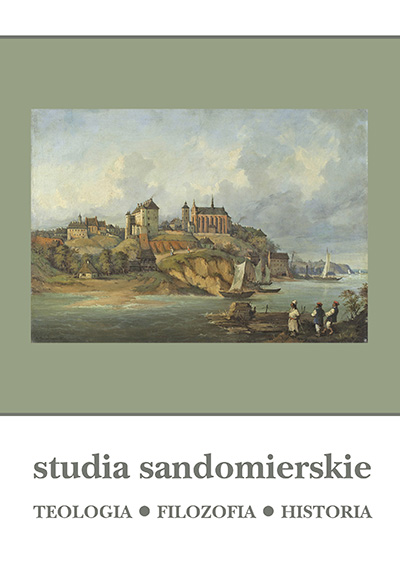Charles Peirce’s “Neglected Argument” for the Reality of God
DOI:
https://doi.org/10.15633/sts.4187Keywords:
Peirce, neglected, argument, reality, GodAbstract
In this text, I have focused on the second of three parts of Charles S. Peirce’s argument for the reality of God. The analysis of Peirce’s inquiry by which he justifies his belief will be based on his work entitled Neglected Argument. The content has been organized as follows: first, the thought process described by Peirce, called: „the play of muse” which humbly leads many people to „God hypothesis”, has been justified as natural for a man. Secondly, „God hypothesis” itself has been validated as a natural result of „the play of muse”. Thirdly, the author of the argument listed three properties of this idea, thanks to which it becomes credible, and thus it comes much closer to the truth. I consider these issues interesting and worthy of further research and scientific work.
References
Ashworth W.B., Light of Reason, Light of Nature. Catholic and Protestant Metaphors of Scientific Knowledge, „Science in Context” (1989), no 3, s. 89–107.
Borg E., Lepore E., Symbolic Logic and Natural Language, w: Blackwell Companion to Philosophical Logic, ed. D. Jacquette, Oxford 2006, s. 86–102.
Borkowski L., Wprowadzenie do logiki i teorii mnogości, Lublin 1991.
Clanton J.C., The Structure of C. S. Peirce’s Neglected Argument for the Reality of God: A Critical Assessment, „Transactions of the Charles S. Peirce Society” (2014), no 2 (50), s. 175–200.
Clarke B.L., Peirce’s Neglected Argument, „Transactions of the Charles S. Peirce Society” (1977), no 4 (13), s. 277–287.
Hume D., Badania dotyczące rozumu ludzkiego, tłum. D. Misztal, T. Sieczkowski, Kraków 2005.
Hume D., Dialogi o religii naturalnej. Naturalna historia religii, tłum. W. Hochfeldowa, Biblioteka Klasyków Filozofii, Warszawa 1962.
Jan Paweł II, Encyklika „Fides et ratio”, Wrocław 2021.
Kaczmarek J., Ontologiczny opis Popperowskiego świata 3, „Przegląd Filozoficzny” 23 (2014), nr 4 (92), s. 383–394.
Katechizm Kościoła Katolickiego, Poznań 2002.
Kessler G.E., A Neglected Argument, „The Paideia Archive” (1998), no 36, Twentieth World Congress of Philosophy, s. 110–118.
Krzos B., Potrzeba, aby On wzrastał. Osoba i postawa kapłana katolickiego w świetle współczesnych wyzwań duszpasterskich w Polsce, Tarnów 2020.
Maryniarczyk A., Zeszyty z metafizyki, t. 1, Monistyczna i dualistyczna interpretacja rzeczywistości, Lublin 2001.
Moskal P., Religia i prawda, Lublin 2008.
Oppy G., Ontological Argument, w: Stanford Encyclopedia of Philosophy, plato.stanford.edu/entries/ontological-arguments [dostęp: 5 III 2021 r.].
Peirce Ch.S., Man’s Glassy Essence, w: The Essential Peirce, vol. 1, 1867–1893, Peirce Edition Project, Bloomington 1992.
Peirce Ch.S., Short Logic, w: Ch.S. Peirce, The Collected Papers, vol. 2, red. Ch. Hartshorne, P. Weiss, Harvard 1931–1935.
Peirce Ch.S., Zaniedbany argument, w: Ch.S. Peirce, Zaniedbany argument i inne pisma z lat 1907–1913, tłum. S. Wszołek, Kraków 2005, s. 81–118;
Popper K., Epistemology without a Knowing Subject, „Studies in Logic and the Foundations of Mathematics” (1968), no 52, s. 333–373 (Epistemologia bez podmiotu poznającego, tłum. A. Tanalska, „Literatura na Świecie” (1984), nr 12 (161), s. 356–402).
Tomasz z Akwinu, Suma teologiczna, tłum. S. Bełch (i inn.), I-XXXIV, Londyn 1962–1986, XXXV: Słownik terminów, oprac. A. Andrzejuk, Warszawa 1998.
Urbaniec J., Trzeci świat Karola Poppera, „Zagadnienia Filozoficzne w Nauce” (1986), nr 8, s. 77–84.
Waal Frans de, Bonobo i ateista. W poszukiwaniu humanizmu wśród naczelnych, tłum. K. Kornas, Warszawa 2015.
Wszołek S., „Zaniedbany Argument” Charlesa Sandersa Peirce’a, „Studia Kulturoznawcze” (2015), nr 1 (7), s. 101–111.
Downloads
Published
Issue
Section
License
Copyright (c) 2021 Bartłomiej Krzos

This work is licensed under a Creative Commons Attribution-NonCommercial-NoDerivatives 4.0 International License.
Authors who publish with this journal agree to the following terms:
- Authors retain the copyright and full publishing rights without restrictions, and grant the journal right of first publication with the work simultaneously licensed under a Creative Commons Attribution 4.0 International License that allows others to share the work with an acknowledgement of the work's authorship and initial publication in this journal.
- Authors are able to enter into separate, additional contractual arrangements for the non-exclusive distribution of the journal's published version of the work (e.g., post it to an institutional repository or publish it in a book), with an acknowledgement of its initial publication in this journal.
- Authors are permitted and encouraged to post their work online (e.g., in institutional repositories or on their website) prior to and during the submission process, as it can lead to productive exchanges, as well as earlier and greater citation of published work (See The Effect of Open Access).

